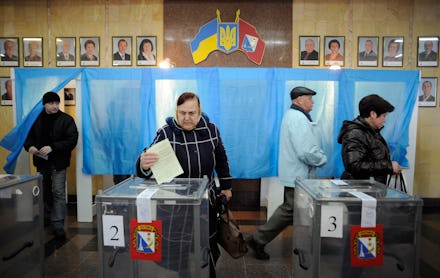Putin Accidentally Reveals the Real Results of Crimea's Election, and It's Exactly What We Feared

The news: Nearly a month and a half after the original vote, the Kharkiv Human Rights Protection Group (KHRPG), one of the oldest Ukrainian human rights organizations, is claiming that the election results from the Crimean referendum are fraudulent. And how do they know that? Because of a report posted on the Russian government's own website.
The report from came from President Vladimir Putin's own Council on the Development of Civil Society and Human Rights (CDCSHR) and says that the "official" election results previously reported by the Kremlin don't hold any water. According to almost all of the citizens and professionals CDCSHR contacted, while turnout in the peninsular city of Sevastopol reached 50-80%, the turnout for all of Crimea was only 50-60%. Of those people, only 50-60% voted in favor of annexation by Russia.
So, according to the panel, just 35% of Crimeans at most officially voted in favor of joining the Russia Federation — a far cry from the Kremlin's claims of overwhelming 95.5% in favor. On the low end, it could be 25%.
More problems: Further clouding the legitimacy of Crimea's referendum is that fact that most voters went to the polls in an atmosphere of fear and uncertainty generated by the arrival of mysterious armed gunmen (who definitely weren't working for or supported by the Kremlin, claims the Kremlin). Many voters cited the presence of "illegal armed formations" as a factor in their voting preference. The KHRPG also says that many Crimeans were threatened with the loss of their land or jobs if they did not vote in a certain way: Civil service and public sector employees were told their roles could only be filled by Russian nationals, while Crimean Tartars were informed that certain agricultural plots could be owned only by Russians in the future.
Despite recent tensions between Russia and the West over the crisis in Ukraine, the KHRPG says the report "can hardly be dismissed as seditious U.S. propaganda." The group points to the ongoing presence of masked men seizing government buildings in Crimea and eastern cities like Slovyansk, claiming that these were not spontaneous people's self-defense movements, but either organized separatist militants backed by the Kremlin or covert Russian forces.
Image Credit: AP
Given the complex nature of Ukraine's history and political geography, it is extremely difficult to separate legitimate red flags from the heated rhetoric and rumors on both sides of the crisis. But while Ukrainian reports can seem suspicious or poorly sourced at times, the Russian government's claims are increasingly ridiculous. And this pointless brinkmanship is escalating steadily and encouraging an all-out insurgency in eastern Ukraine.
The takeaway: While some analysts are characterizing the numbers as leaked election results from Putin's government, CDCSHR's numbers instead seems to demonstrate that even members on Russian commissions are skeptical of official results. To be fair, the CDCSHR appears to be an advisory panel that often voices anti-Kremlin dissent, including desperately urging Putin not to invade Ukraine in March. But critics have argued that it's a "Potemkin village," designed to create the illusion of dissent, while others note that such bodies can often become important during transition periods between governments.
To be clear, what the CDCSHR report does not demonstrate is widespread dissent within the Kremlin over the current Ukrainian crisis, or whether Russia has adequate safeguards against presidential authority on such matters. It is, however, yet another piece of evidence against Russian claims that Crimean Ukrainians widely supported annexation are hogwash.